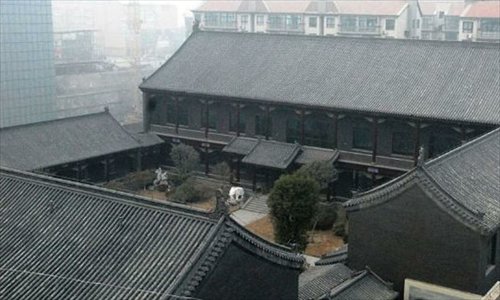HOME >> CHINA
Military court charges ex-PLA officer over corruption
Source:Global Times Published: 2014-4-1 1:03:01

Dubbed the "General's Residence",Gu's compound in downtown Puyang, Henan Province was built to resemble the Fobidden City. Photo: Caixin.com
Gu Junshan, a former senior military logistics officer, was charged with embezzlement, bribery, misuse of State funds and abuse of power, said China's military prosecutor on Monday.
The military prosecutor filed the charge with a military court on Monday, the Xinhua News Agency reported.
Gu, 57, was deputy head of the General Logistics Department of the People's Liberation Army (PLA).
He stepped down from his post in February 2012. Speculation since has been of an anti-corruption investigation into him. However, army authorities didn't make his status public until Monday's announcement of charges against him.
Gu, who held the rank of lieutenant general, will be the highest-ranking officer to stand trial at the military court since 2006.
Gong Fangbin, a professor from the PLA's National Defense University, told the Global Times that since 1978, few officers with the rank of lieutenant general had stood trial.
According to Gong, the relatively long period for probes into Gu, who held a key position in the PLA's core department, indicated the complexities and severity of the case.
"The trial at military court wouldn't be made fully public due to the fact that it may involve confidential military information, though Gu's criminal facts and sentence will be announced," Gong said, adding Gu's case has exhibited more openness than other similar cases.
An opinion piece on the PLA's news portal 81.cn said though the case might be heard behind closed doors, it wouldn't be a "secret trial," and will be handled in accordance with the law.
Earlier this year, the lavish lifestyle of Gu was revealed by the media. He is reported to have dozens of properties, from one of which a number of gold statues were confiscated.
According to reports from caixin.com, Gu, who was once in charge of the military's infrastructure constructions, obtained huge economic interests by seeking kickbacks in the sale of land owned by the military.
It was reported that Gu owns dozens of properties in Beijing, and Gu's brother, who set up plants to produce military supplies, had built seven villas for the Gu family in their hometown in Puyang, Central China's Henan Province.
According to Caixin, Gu's compound in downtown Puyang, which occupies nearly a hectare of land, was built to imitate the Forbidden City and dubbed the "General's Residence."
During a search of Gu's Puyang villa in January 2013, a golden statue of Chairman Mao Zedong, a golden washbasin, a golden statue of a ship and boxes of Moutai were confiscated by authorities, said reports.
Gu's alleged corruption prompted public attention toward graft in the country's military, which is considered a tricky issue due to limited information from authorities.
Since December 2012, the Central Military Commission has issued a series of rules to curb irregularities, including an alcohol ban and strict rules for the use of military vehicles.
The anti-graft drive in the military is in line with the country's vow to wage a long-term war against corruption.
Posted in: Military